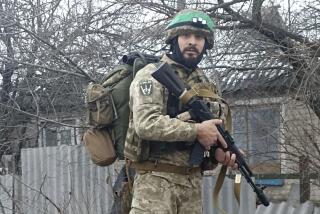Colombia Seeks to Turn Public Anger Into a Catalyst for Peace
- Share via
LOS POZOS, Colombia — Weekly public hearings, a feature of the peace talks to end this country’s increasingly brutal conflict, promised to provide Colombians a forum for telling their government and the insurgents who have fought it for 36 years how they think the country should be run.
So far, about 5,000 people, from union workers to business owners to students, have come to guerrilla-controlled territory to propose ideas. But the trip hasn’t always worked out as they had planned.
Juan Pablo Calle rode a government-supplied bus 28 hours from the slums of the capital, Bogota, to this steamy village to talk about Colombia’s job shortage. It’s a topic that matters a lot to him because he belongs to the 20% of the country’s work force who are unemployed.
So, after he spent the night in a crowded tent and stood in line to shower the next morning, he waited expectantly for the government and guerrilla peace negotiators to take their places on the dais of a specially built open-air auditorium. But the government’s head negotiator sent word that he wouldn’t be attending because of a cold.
“Our hope was to be heard by government representatives, who always turn deaf ears to the public,” said Calle, who led chants protesting the absence of top government negotiators.
“When the representatives of economic monopolies came, high-level officials were here,” he said. “But when it is for the people, they send second-class employees, decorative figures. We feel cheated.”
A researcher at the Pontifical Javeriana University in Bogota sympathized: “The [hearings] show how little public opinion is taken into consideration--which is to say, nothing.” Like all the analysts interviewed, he spoke only on the condition of anonymity because Colombian university researchers are routinely attacked, often fatally, by gunmen who disagree with them.
“It is not participation,” he said. “It is co-optation.”
But recently appointed Development Minister Augusto Ramirez Ocampo, who is the government liaison between civic groups and the peace process, noted that even the concept of including the public in the negotiations is an important step.
“Five years ago,” he said, “civil society considered the war a confrontation between the armed forces and the guerrillas in which civilians had no role. Now there is such a proliferation of nongovernmental organizations dedicated to peace that it is hard to coordinate them.”
The National Conciliation Committee is an umbrella organization that tries to do that. Its director, Camilo Gonzalez Pozo, acknowledged that the most important role that civil society thus far has played has been to pressure the warring factions into negotiations in the first place.
The challenge is to channel the anger that moved millions of Colombians to march for peace, vote for peace in a referendum and elect a president who promised peace two years ago into a force for molding the hoped-for peace.
“In Colombia, we have to change the model for peace negotiations,” Gonzalez said. “It’s not enough to just make suggestions in the hearings. Society has to intervene directly in the peace process.”
Some foreign diplomats question that position, insisting that negotiations are most effective when they are conducted by top leaders with the authority to make commitments and the credibility to persuade their followers to keep them.
On the other hand, Colombia’s negotiating agenda reflects the complex social and economic problems behind the long conflict, and those problems touch everyone in the country. In fact, diplomats compare Colombia’s entrenched problems to those of Northern Ireland or the Middle East rather than the relatively short Central American peace negotiations in which Ramirez Ocampo played a role.
Gonzalez warned that Colombians should be prepared for seven years or more of talks.
That time period is a concern, because Colombians already are growing impatient as months of negotiations bring no sign that the fighting is close to an end.
“In early July, they exchanged truce proposals and there was great enthusiasm,” said a political scientist at the National University in Bogota. With the truce failing to materialize, that enthusiasm has been replaced by skepticism, he said.
The Javeriana researcher said the government and guerrillas should start listening to the public by recognizing the wisdom of the insistence that the fighting stop.
“You cannot construct a peace project in the middle of a war,” he said. “You have to construct values of how to live together, then build the bridges and roads. Otherwise, it only makes the war more sophisticated.”
More to Read
Sign up for Essential California
The most important California stories and recommendations in your inbox every morning.
You may occasionally receive promotional content from the Los Angeles Times.













